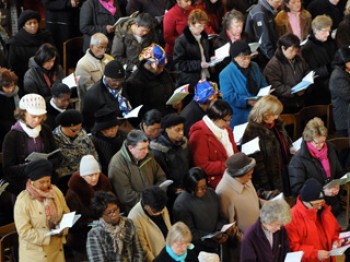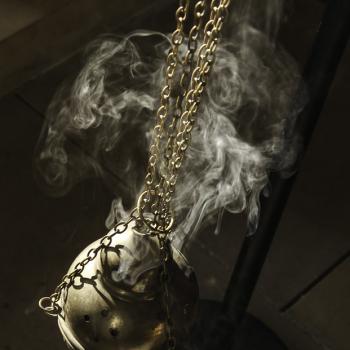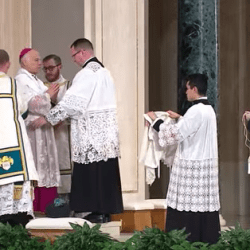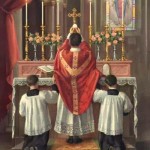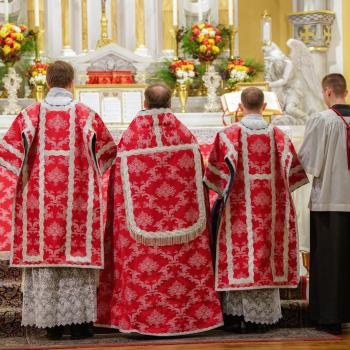Over the last couple days, as reaction has trickled in to the new translation of the Mass, there seems to be a common theme: we the people haven’t been affected as much, because it’s the priest who has all the newfangled words and prayers to worry about. “Our parts,” people in the pews seem to be saying, “aren’t all that different.”
But to think that way misses an important point — and it gets something about the Mass fundamentally wrong.
The fact is: the Mass belongs to everyone. We pray it together. We offer it together. It is an act of the community. While the people’s verbal responses aren’t radically different, what the priest says on our behalf matters. He offers this great sacrifice with us and for us. We need to be attentive, engaged, invested in what is taking place.
We’re all familiar with the “full, active, conscious participation” idea so often quoted from the documents of Vatican II. That phrase comes from the Constitution on the Sacred Liturgy. But there is something else we need to remember, from that same document:
The Church…earnestly desires that Christ’s faithful, when present at this mystery of faith, should not be there as strangers or silent spectators; on the contrary, through a good understanding of the rites and prayers they should take part in the sacred action conscious of what they are doing, with devotion and full collaboration. They should be instructed by God’s word and be nourished at the table of the Lord’s body; they should give thanks to God; by offering the Immaculate Victim, not only through the hands of the priest, but also with him, they should learn also to offer themselves; through Christ the Mediator [38], they should be drawn day by day into ever more perfect union with God and with each other, so that finally God may be all in all.
The complete celebration of the Mass is so much more than just what we say or do. It isn’t a spectator sport. And it has nothing to do with how many people lector, or serve as EMHCs or lead the congregation singing “Gather Us In.” The Mass demands to be prayed collectively, along with the priest; it should involve our hearts and minds at every moment, with the praying of every syllable. I would urge those who are thinking of the Mass as a sum of many vocal parts — the priest’s and everybody else’s — to take a closer look, and lend an ear. Again and again, the priest cries out to God on our behalf. “We give you ceaseless thanks with the choirs of heaven,” he prays at one point. “To you, most merciful Father, we make humble prayer and petition…that you accept and bless these gifts, these offerings, these holy and unblemished sacrifices which we offer you firstly for your holy catholic Church…” The priest doesn’t act alone; it’s not a solo enterprise.
Or: as my pastor mentioned during his first celebration of this new liturgy: “We’re all in this together.”
We are. We must be. And for the new Mass to truly be embraced, each of us has to do more than just say our part or listen for our cue.
We need to make it totally ours.
Because, whether we realize it or not, it is.

